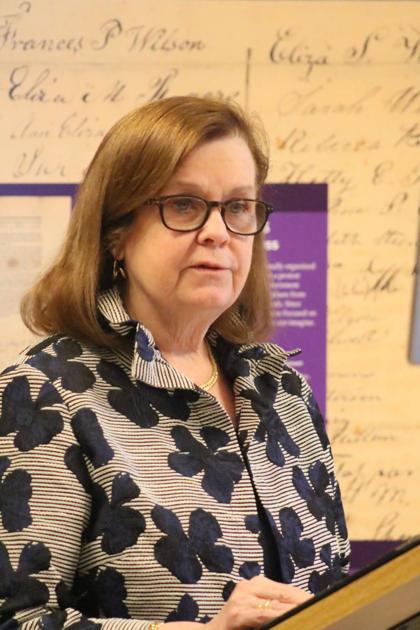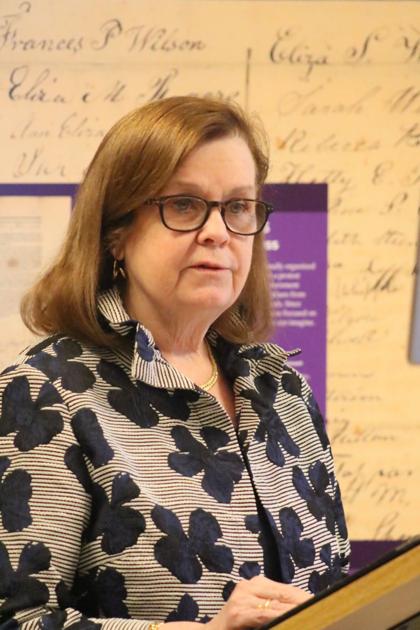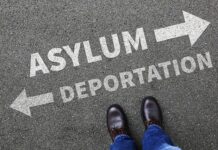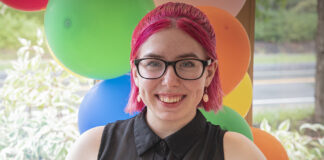
CUMBERLAND — A traveling exhibit that opened to the public Saturday at Allegany Museum melds local and national elements to examine the country’s history of voting and civic engagement.
The museum was selected through Maryland Humanities’ “Museums on Main Street” program to display the “Voices and Votes: Democracy in America” traveling Smithsonian exhibit. Allegany County is one of five counties selected statewide to host the display in 2021.
Maryland Humanities board member and local resident Mary Kay Finan said the museum was “lucky” to have been selected to host the display. The exhibit will remain at the museum for six weeks.
“We know that Maryland has many stories to explore, and they connect to the exhibit themes,” Finan said.
In addition to the Smithsonian display, which examines the country’s history of voting and more, companion exhibits feature the photography and political button collection of local historian Albert Feldstein. For the latter, the museum partnered with Frostburg State University, which owns Feldstein’s buttons.
Feldstein’s photos on display cover 40 years of protests in Allegany County, from more recent happenings like the rallies held on the downtown mall in the summer of 2020 in support of George Floyd and law enforcement, respectively, to older demonstrations like the three days of protests in October 2004 that followed the removal of a monument of the Ten Commandments from the grounds of the county courthouse. The monument was eventually returned.
There’s another local connection, too. Two Frostburg students, sophomore Max Hancock and senior Jessica Thayer, are included in the Smithsonian exhibit.
They shared their respective reasoning for being civically engaged in videos that are included as part of the display, which will travel the country through 2026.
Frostburg President Ronald Nowaczyk, who also serves as a Maryland Humanities board member, noted the campus history of civic engagement, and spoke to the greater importance of the exhibit.
“During these times, when citizenship and civic engagement are under so much scrutiny and debate, initiatives such as the Maryland Humanities Museum on Main Street (program) with exhibits like this remind us of the importance of civic responsibility,” Nowaczyk said. “I will tell you that as a president and an individual who grew up in the 60s, the student activism we’re seeing is reminding me what it was when I was a student. I’m on the other side of the desk now.”
In his video, Hancock, who is transgender, spoke of how experiences in high school led him to activism in the form of serving as the president of his campus Gay-Straight Alliance. Hancock told the Times-News that, while he didn’t originally intend to keep up his activist work in college, that hasn’t been the case.
“I was like ‘Well, this seems to be something I can’t avoid,’” Hancock, an economics major, said. “I”m being pulled in many directions, most notably toward public advocacy.”
Hancock said he’s excited to have a platform to provide representation and encouragement to other transgender youth. Despite having some trepidation, he said, he feels generally positive about the experience.
“There’s a lot of pressure on every trans person when they come out to be the one who explains being trans to all of their peers, all of their friends, all of their family. And that is a ridiculous thing to ask of people,” Hancock said. “So, to any extent that I can do that for people, I think I will be essentially performing my civic duty in a way that not a lot of other people have the chance to do, and it would be selfish of me not to provide that support for my peers.”
Thayer, a triple major in law, political science, and philosophy, said she feels it’s her role to use her privilege and her platform for the good of others. “One voice can change a million hearts and minds,” she said.
“As a white cis woman, I’ve benefitted from a lot of the things that history has handed down to me,” Thayer said. “I think that it is not only my civic duty to advocate for others to vote and to get out and be engaged, but also to look at the issues that lie deeper, to look at the reason that I’m able to stand here today and the privilege that I have, and use my platform to reach out to others who don’t have that same privilege. It’s using my voice not only as a guide for my future and for others like me, but making sure that I’m taking everyone along with me.”







